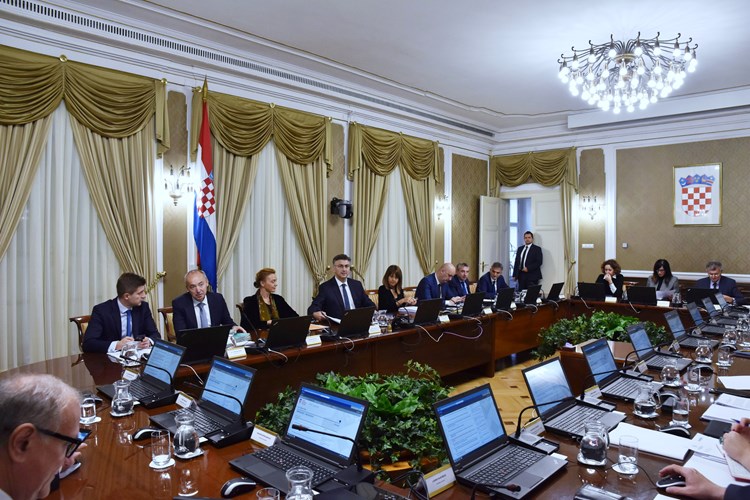


The government on Wednesday sent to parliament a final bill on foster parenting which treats foster care as a job by foster parents who have been unemployed and also provides for specialised foster caring for children with special needs, so that carers in all those cases are properly remunerated.
The Minister of Demography, Family, Youth and Social Welfare, Nada Murganic, said that the bill had been prepared in a bid to improve the current unsatisfactory state of affairs in the field of foster parenting, given that there are not enough foster families and that they are unevenly distributed across the country.
The new law enables the continuation of traditional and kinship care, too.
The measures envisaged in the new legislation are meant to improve the conditions of foster carers and to enable younger persons out of work to become foster carers.
The state budget allocations to be set aside for this purpose will be increased by an additional HRK 15.5 million.
Thus, a total of HRK 228.5 million kuna will be set aside for foster caring services, and of that amount 183 million will go to children covered by this care and 45.5 million kuna as remuneration to carers.
This summer Minister Murganic said that according to her ministry's statistics, 2,259 children were then being cared for by 1,202 foster families in Croatia.
Furthermore, 814 children without adequate parental care were in institutions, and 90 children were under the age of three.
The new legislation, aimed at encouraging foster parenthood, is designed to raise the number of foster parents and promote foster care for children with special needs.
The Croatian government on Wednesday adopted a bill ratifying the Convention on Police Cooperation in Southeast Europe, which is considered the strongest legal basis for police cooperation in the region.
The Convention, in force since 2006, currently has 11 member states: Austria, Slovenia, Hungary, Bulgaria, Romania, Serbia, Montenegro, Albania, Macedonia, Moldova, and Bosnia and Herzegovina, Interior Minister Davor Bozinovic said at a cabinet meeting.
It is expected that the Convention will help the state parties to get closer to the standards of police cooperation that exist within the Schengen area, he said.
The Convention provides for cooperation in combating organised crime, terrorism, illegal migration and other threats to public order, as well as for joint threat analyses, exchanges of information and experience, cross-border surveillance, covert investigations, joint investigative teams, data and witness protection, and liaison officers.
Bozinovic said that Croatia would raise the issue of provisions that are not fully compatible with EU and Croatian legislation and provisions concerning the confidentiality and classification of information, and data protection and exchange.
The government on Wednesday adopted a decision to invite applications for the issuance of hydrocarbon exploration and exploitation permits for seven locations in northwestern and central Croatia and central Slavonia.
Environmental Protection and Energy Minister Tomislav Coric said the decision did not apply to existing exploitation fields and national and nature parks.
In June 2016, the government signed a contract on the exploration and exploitation of hydrocarbons on five land locations with the Croatian energy company INA and Canada's Vermilion Energy.
Coric said the invitation of new permits was a continuation of activities begun that year.
The government will issue permits for each location for a maximum of 30 years.
The government also sent a new agriculture bill to parliament for a second reading, and gave Croatia Airlines its consent to borrow HRK 20 million from the Croatian Postal Bank for current assets. The national airline can use the loan until 15 December 2018 and must repay it by 15 December 2019.
The cabinet of Prime Minister Andrej Plenkovic on Wednesday decided to amend the government's decision of May 2014 on setting up barriers on roads along the border with Bosnia and Herzegovina and Serbia in a bid to prevent illegal passage outside border crossings, enhance the control of the borderline and curb off all forms of smuggling and trafficking.
Explaining today's amendment, Interior Minister Davor Bozinovic said that the state border supervision legislation envisaged that all roads and routes that were not in the function of crossing the border could be obstructed by barriers so as to halt illegal border crossings outside the official border crossings and a decision to that effect was adopted by the Croatian government in April 2014.
The latest inspection on the ground has pointed to the need to set up barriers at 13 additional locations along the state border with Bosnia and Herzegovina, Bozinovic said today.
The appropriate barriers could be cement blocks or ditches that can prevent vehicles from passing, according to the minister's explanation.
All this is supposed to help improve control of the state border and thwart all forms of smuggling and trafficking along the borderline covered by the Croatian police in the four counties: Sisak-Moslavina, Dubrovnik-Neretva, Lika-Senj and Zadar.